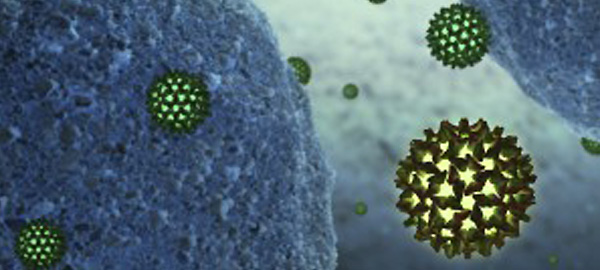Vaccines and Anti-Infectives
Leading the fight against global pandemics and local infections
Infectious diseases are a substantial health threat and a leading cause of death worldwide. Hospital-acquired infections with multi-drug resistant microbes have become increasingly common, a risk for patients and a burden on healthcare systems. Up to 32% of surgical patients get a post-op infection, 51% of these infections are resistant to antibiotics. Offering solutions to combat the increasing worldwide spread of dangerous pathogens, a number of highly innovative Austrian companies are transforming the world of antibiotic therapy or working on novel vaccines and therapeutics.

Therapeutic Vaccines
Hookipa Biotech is a start-up biotech company founded in Vienna in summer 2011. The company’s mission is to develop innovative vaccines for the prevention and treatment of various diseases, based on its proprietary VaxwaveTM technology. It is based on a patent-protected family of engineered viruses, which naturally elicit neutralizing antibodies and extremely potent T cell responses. A prophylactic vaccine against Cytomegalovirus is currently undergoing Phase II clinical trials.
Affiris’ vision is to use active immunotherapy to prevent chronic diseases like Alzheimer’s, Parkinson’s or atherosclerosis. Their aim is to trigger the body’s immune responses to combat these chronic diseases at the very beginning of the pathology. Affiris designs short synthetic peptides that are very similar to the target protein that plays a part in the disease mechanism. These peptides then trigger the production of antibodies, which interfere with the development of the disease.
Accanis focuses on the treatment of localised diseases that have well established molecular targets. Instead of introducing proteins to interact with these targets, Accanis is working with messenger RNA (mRNA). mRNA coding for the desired protein is transcribed in-vitro and is then introduced into the cells. The cells themselves then produce the desired protein to combat the disease.
Themis Bioscience uses an advanced platform technology that enables the production of innovative vaccines candidates against a range of infectious diseases, like Chikungunya, Zika or Noro. The technology targets directly immune cells and leads to a sustained development of the selected antigen. This should lead to a robust and long-term immunity. Late in 2018 the company published promising results from its Phase II study against Chikungunya. It has been awarded PRIME designation status from the European Medicines Agency.
S-Target is working with a platform technology, which can be used to develop novel therapeutic vaccines to cure and prevent allergic diseases like allergy to the house dust mite. They aim to cure allergies rather than treat the symptoms as many current allergy drugs do.
Origimm is developing therapies to prevent and treat acne vulgaris. In Origimm’s novel approach the starting point to discover an antigen with protective potential is not an assumption or initial findings on the antigen itself, but clinical samples. Clinical samples hold protective antibodies that are screened for their clinical potential in an array of immunological assays.
Bacterial Infections
In recent years, the effectiveness of many antibiotics has declined due to growing antibiotic resistance and cross-resistance. As a result, healthcare providers have fewer options when treating serious infections, and they may be forced to use antibiotics that may be more toxic to patients and frequently more expensive and less effective. In 2010, the World Health Organization (WHO) stated that antibiotic resistance is one of the three greatest threats to human health.
Nabriva Therapeutics is one of few biopharmaceutical companies developing a new class of antibiotics called pleuromutilins, specifically to address serious infections in humans caused by antibiotic resistant pathogens. Recent clinical Phase III data for Nabriva’s lead pleuromutilin, Lefamulin against community-acquired bacterial pneumonia (CAPB) have demonstrated all EMA and FDA endpoints. The company is filing for registration of the drug in the US and Europe. The company is listed at NASDAQ since 2015.
Clostridium difficile is the most common infectious cause for nosocomial diarrhea in Europe and the US. Currently it is one of the most common hospital acquired infections. There are an estimated 450,000 cases of C. difficile in the US annually and no vaccine against the disease available. Valneva successfully completed Phase 2 development of its prophylactic vaccine candidate against Clostridium difficile infection, confirming previously announced positive data. The vaccine candidate VLA84 is Phase 3 ready.
The Oxford Antibiotics Group is a drug discovery and development company that specialises in screening of natural compounds. These natural compounds are developed into new antibacterial therapies. Oxford Antibiotics Group’s therapeutic focus lies on MRSA infections, infections of the skin and healthcare-associated pneumonia.
Finally, natural substances, particularly those sourced from a marine environment, are an increasingly popular source of products. Marinomed Biotechnologie specialises in the development of innovative products based on patent protected technology platforms in the field of respiratory and ophthalmic diseases. Marinomed has developed two platforms to date: the Carragelose® platform, derived from red seaweed and the Marinosolv® technology platform. The Carragelose® platform is already used in six different products to treat viral infections of the respiratory tract, which are sold globally via the company’s partners. The Marinosolv® technology platform enhances the efficacy of hardly soluble compounds. This innovative technology has the potential to sustainably change a number of therapies for allergies and auto-immune diseases. The flagship product Budesolv has started its pivotal Phase III approval study in late 2018.
